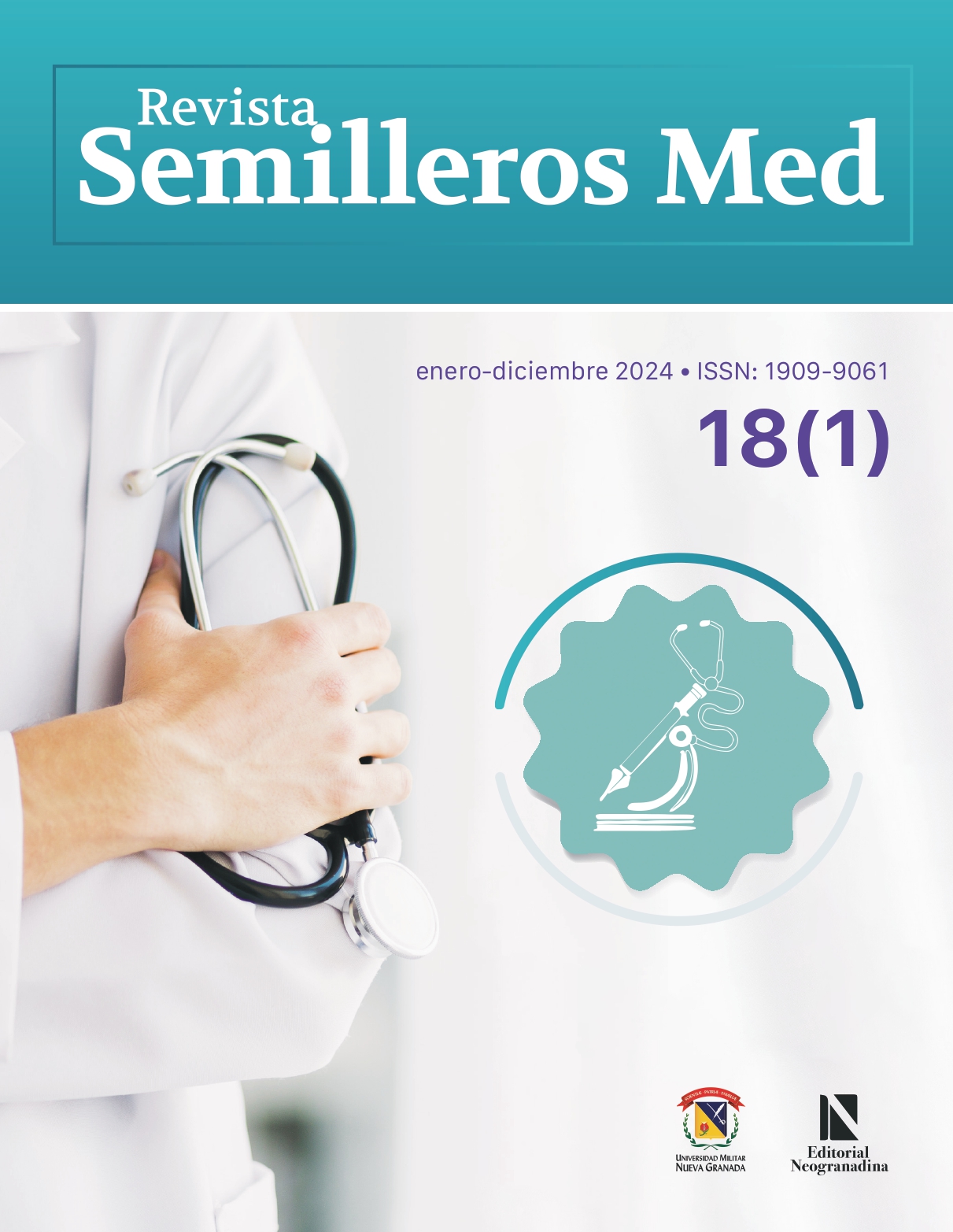Desarrollo de linfomas y leucemias mediado por disbiosis intestinal derivada de la administración prolongada de antibióticos. Revisión narrativa de la literatura
Resumen
Este artículo de revisión tiene como objetivo establecer la conexión entre los cambios de la microbiota gastrointestinal inducidos por el consumo prolongado de antibióticos y su impacto en el proceso de hematopoyesis, y cómo esto conduce al desarrollo de neoplasias de línea blanca como leucemias y linfomas. Para lograr este objetivo, se realizó una búsqueda bibliográfica en diversas bases de datos electrónicas como PubMed, Scopus, ClinicalKey y AccessMedicine, centrándose en estudios de la última década, de 2014 a 2024. Mediante el empleo de los descriptores en salud MeSH (“gastrointestinal microbiome”, “mielopoiesis”, “dysbiosis”, “anti-bacterial agents”, “leukemia”) y DeCS (“microbioma gastrointestinal”, “mielopoyesis”, “disbiosis”, “antibacterianos”, “leucemia”), se seleccionaron estudios clínicos aleatorizados controlados y revisiones de la literatura. Los resultados obtenidos revelan que la disbiosis intestinal, provocada por la administración descontrolada y prolongada de antibióticos, interfiere con procesos inmunológicos críticos, que inducen a alteraciones en la hematopoyesis y predisponen al desarrollo de malignidades hematológicas. Se concluye que existe una relación significativa entre la perturbación de la microbiota gastrointestinal y la incidencia de trastornos oncólogo-hematológicos, subrayando la necesidad de moderar el uso de agentes antibacterianos para mitigar estos efectos adversos
Referencias bibliográficas
Yan H, Baldridge MT, King KY. Hematopoiesis and the bacterial microbiome. Blood. 2018 ago. 9;132(6):559-64. https://doi.org/10.1182/blood-2018-02-832519
Belkaid Y, Harrison OJ. Homeostatic immunity and the microbiota. Immunity. 2017 abr.;46(4):562-76. https://doi.org/10.1016/j.immuni.2017.04.008
Schroeder BO, Bäckhed F. Signals from the gut microbiota to distant organs in physiology and disease. Nat Med. 2016 oct. 6;22(10):1079-89. https://doi.org/10.1038/nm.4185
D’Angelo G. Microbiota and hematological diseases. Int J Hematol Oncol Stem Cell Res. 2022 jul. 24; https://doi.org/10.18502/ijhoscr.v16i3.10139
Tamburini S, Shen N, Wu HC, Clemente JC. The microbiome in early life: implications for health outcomes. Nat Med. 2016 jul. 7;22(7):713-22. https://doi.org/10.1038/nm.4142
Allegra A, Innao V, Allegra AG, Ettari R, Pugliese M, Pulvirenti N, et al. Role of the microbiota in hematologic malignancies. Neth J Med. 2019 feb.;77(2):67-80. PMID: 30895929
The Human Microbiome Project Consortium. Structure, function and diversity of the healthy human microbiome. Nature. 2012 jun. 13;486(7402):207-14. https://doi.org/10.1038/nature11234
Chen Y, Zhou J, Wang L. Role and mechanism of gut microbiota in human disease. Front Cell Infect Microbiol. 2021mzo.17;11. https://doi.org/10.3389/fcimb.2021.625913
Fan Y, Pedersen O. Gut microbiota in human metabolic health and disease. Nat Rev Microbiol. 2021 ene. 4;19(1):55-71. https://doi.org/10.1038/s41579-020-0433-9
Biagi E, Candela M, Turroni S, Garagnani P, Franceschi C, Brigidi P. Ageing and gut microbes: Perspectives for health maintenance and longevity. Pharmacol Res. 2013 mzo.;69(1):11-20. https://doi.org/10.1016/j.phrs.2012.10.005
Fattizzo B, Cavallaro F, Folino F, Barcellini W. Recent insights into the role of the microbiome in malignant and benign hematologic diseases. Crit Rev Oncol Hematol. 2021 abr.;160:103289. https://doi.org/10.1016/j.critrevonc.2021.103289
Honda K, Littman DR. The microbiota in adaptive immune homeostasis and disease. Nature. 2016 jul. 7;535(7610):75-84. https://doi.org/10.1038/nature18848
Thaiss CA, Zmora N, Levy M, Elinav E. The microbiome and innate immunity. Nature. 2016 jul. 7;535(7610):65-74. https://doi.org/10.1038/nature18847
Samuelson DR, Welsh DA, Shellito JE. Regulation of lung immunity and host defense by the intestinal microbiota. Front Microbiol. 2015 oct. 7;6. https://doi.org/10.3389/fmicb.2015.01085
Rieger MA, Schroeder T. Hematopoiesis. Cold Spring Harb Perspect Biol. 2012 Dec 1;4(12):a008250–a008250. https://doi.org/10.1101/cshperspect.a008250
Rakoff-Nahoum S, Foster KR, Comstock LE. The evolution of cooperation within the gut microbiota. Nature. 2016 may. 12;533(7602):255-9. https://doi.org/10.1038/nature17626
Weiss GA, Hennet T. Mechanisms and consequences of intestinal dysbiosis. Cellular and Molecular Life Sciences. 2017 ago. 28;74(16):2959-77. https://doi.org/10.1007/s00018-017-2509-x
Oliveira NM, Niehus R, Foster KR. Evolutionary limits to cooperation in microbial communities. Proceedings of the National Academy of Sciences. 2014 dic. 16;111(50):17941-6. https://doi.org/10.1073/pnas.1412673111
Manrique P, Bolduc B, Walk ST, van der Oost J, de Vos WM, Young MJ. Healthy human gut phageome. Proceedings of the National Academy of Sciences. 2016 sept. 13;113(37):10400–5. https://doi.org/10.1073/pnas.1601060113
Shkoporov AN, Hill C. Bacteriophages of the human gut: The “known unknown” of the microbiome. Cell Host Microbe. 2019 feb.;25(2):195-209. https://doi.org/10.1016/j.chom.2019.01.017
Ramirez J, Guarner F, Bustos Fernandez L, Maruy A, Sdepanian VL, Cohen H. Antibiotics as major disruptors of gut microbiota. Front Cell Infect Microbiol. 2020 nov. 24;10. https://doi.org/10.3389/fcimb.2020.572912
Levy M, Kolodziejczyk AA, Thaiss CA, Elinav E. Dysbiosis and the immune system. Nat Rev Immunol. 2017 abr 6;17(4):219-32. https://doi.org/10.1038/nri.2017.7
Hrncir T. Gut Microbiota Dysbiosis: Triggers, Consequences, Diagnostic and Therapeutic Options. Microorganisms. 2022 mzo. 7;10(3):578. https://doi.org/10.3390/microorganisms10030578
Scheperjans F, Aho V, Pereira PAB, Koskinen K, Paulin L, Pekkonen E, et al. Gut microbiota are related to Parkinson’s disease and clinical phenotype. Movement Disorders. 2015;30(3). https://doi.org/10.1002/mds.26069
Fernandez Sanchez JV, Maknojia AA, King KY. Blood and guts: How the intestinal microbiome shapes hematopoiesis and treatment of hematologic disease. Blood Journal. 2024 feb. 16; https://doi.org/10.1182/blood.2023021174
Schubert ML, Rohrbach R, Schmitt M, Stein-Thoeringer CK. The potential role of the intestinal micromilieu and individual microbes in the immunobiology of chimeric antigen receptor T-Cell therapy. Frontiers in Immunology. 2021 may. 31;12. https://doi.org/10.3389/fimmu.2021.670286
Kesavelu D, Jog P. Current understanding of antibiotic-associated dysbiosis and approaches for its management. Ther Adv Infect Dis. 2023 ene. 24. https://doi.org/10.1177/20499361231154443
Lange K, Buerger M, Stallmach A, Bruns T. Effects of antibiotics on gut microbiota. Digestive Diseases. 2016;34(3):260-8. https://doi.org/10.1159/000443360
Allaband C, McDonald D, Vázquez-Baeza Y, Minich JJ, Tripathi A, Brenner DA, et al. Microbiome 101: Studying, analyzing, and interpreting gut microbiome data for clinicians. Clinical Gastroenterology and Hepatology. 2019 ene.;17(2):218-30. https://doi.org/10.1016/j.cgh.2018.09.017
Strati F, Pujolassos M, Burrello C, Giuffrè MR, Lattanzi G, Caprioli F, et al. Antibiotic-associated dysbiosis affects the ability of the gut microbiota to control intestinal inflammation upon fecal microbiota transplantation in experimen-
tal colitis models. Microbiome. 2021 dic. 6;9(1):39. https://doi.org/10.1186/s40168-020-00991-x
Duan H, Yu L, Tian F, Zhai Q, Fan L, Chen W. Antibiotic-induced gut dysbiosis and barrier disruption and the po-
tential protective strategies. Crit Rev Food Sci Nutr. 2022 feb. 16;62(6):1427-52. https://doi.org/10.1080/10408398.2020.1843396
Bugl S, Wirths S, Radsak MP, Schild H, Stein P, André MC, et al. Steady-state neutrophil homeostasis is dependent on TLR4/TRIF signaling. Blood. 2013 ene. 31;121(5):723-33. https://doi.org/10.1182/blood-2012-05-429589
Verma R, Lee C, Jeun E-J, Yi J, Kim KS, Ghosh A, et al. Cell surface polysaccharides of Bifidobacterium bifidum induce the generation of Foxp3+ regulatory T cells. Sci Immunol. 2018 oct. 26;3(28). https://doi.org/10.1126/sciimmunol.aat6975
Caiado F, Kovtonyuk L V., Gonullu NG, Fullin J, Boettcher S, Manz MG. Aging drives Tet2+/− clonal hematopoiesis via IL-1 signaling. Blood. 2023 feb. 23;141(8):886-903. https://doi.org/10.1182/blood.2022016835
Meisel M, Hinterleitner R, Pacis A, Chen L, Earley ZM, Mayassi T, et al. Microbial signals drive pre-leukaemic myeloproliferation in a Tet2-deficient host. Nature. 2018;557(7706). https://doi.org/10.1038/s41586-018-0125-z
Bowman RL, Busque L, Levine RL. Clonal hematopoiesis and evolution to hematopoietic malignancies. Cell Stem Cell. 2018 feb.;22(2):157-70. https://doi.org/10.1016/j.stem.2018.01.011
Musolino C, Allegra A, Innao V, Allegra AG, Pioggia G, Gangemi S. Inflammatory and anti-inflammatory equilibrium, proliferative and antiproliferative balance: The role of cytokines in multiple myeloma. Mediators of Inflammation. 2017;2017:1-24. https://doi.org/10.1155/2017/1852517
Ternák G, Berényi K, Németh B, Szenczi Á, Márovics G, Kiss I. Association of antibiotic-consumption patterns with the prevalence of hematological malignancies in European countries. Sci Rep. 2022 may. 12;12(1):7821. https://doi.org/10.1038/s41598-022-11569-y
Staffas A, Burgos da Silva M, Slingerland AE, Lazrak A, Bare CJ, Holman CD, et al. Nutritional Support from the Intestinal Microbiota Improves Hematopoietic Reconstitution after Bone Marrow Transplantation in Mice. Cell Host Microbe. 2018 abr.;23(4):447-457.e4. https://doi.org/10.1016/j.chom.2018.03.002
Elegido A, Graell M, Andrés P, Gheorghe A, Marcos A, Nova E. Increased naive CD4+ and B lymphocyte subsets are associated with body mass loss and drive relative lymphocytosis in anorexia nervosa patients. Nutrition Research. 2017;39. https://doi.org/10.1016/j.nutres.2017.02.006
Ternák G, Berényi K, Sümegi A, Szenczi Á, Fodor B, Németh B, et al. Antibiotic consumption patterns in European countries may be associated with the incidence of major carcinomas. Antibiotics. 2020;9(10). https://doi.org/10.3390/antibiotics9100643
Uribe-Herranz M, Klein-González N, Rodríguez-Lobato LG, Juan M, de Larrea CF. Gut microbiota influence in hematological malignancies: From genesis to cure. International Journal of Molecular Sciences. 2021 ene. 20;22(3):1026. https://doi.org/10.3390/ijms22031026
Rajagopala S V., Yooseph S, Harkins DM, Moncera KJ, Zabokrtsky KB, Torralba MG, et al. Gastrointestinal microbial populations can distinguish pediatric and adolescent Acute Lymphoblastic Leukemia (ALL) at the time of disease diagnosis. BMC Genomics. 2016 dic. 15;17(1):635. https://doi.org/10.1186/s12864-016-2965-y
Song Y, Himmel B, Öhrmalm L, Gyarmati P. The microbiota in hematologic malignancies. Curr Treat Options Oncol. 2020 ene. 11;21(1):2. https://doi.org/10.1007/s11864-019-0693-7
Pflug N, Kluth S, Vehreschild JJ, Bahlo J, Tacke D, Biehl L, et al. Efficacy of antineoplastic treatment is associated with the use of antibiotics that modulate intestinal microbiota. Oncoimmunology. 2016 jun. 2;5(6):e1150399. https://doi.org/10.1080/2162402X.2016.1150399
Viaud S, Saccheri F, Mignot G, Yamazaki T, Daillère R, Hannani D, et al. The intestinal microbiota modulates the anticancer immune effects of Cyclophosphamide. Science (1979). 2013 nov. 22;342(6161):971–6. https://doi.org/10.1126/science.1240537
Zhao L-Y, Mei J-X, Yu G, Lei L, Zhang W-H, Liu K, et al. Role of the gut microbiota in anticancer therapy: from molecular mechanisms to clinical applications. Signal Transduct Target Ther. 2023 may. 13;8(1):201. https://doi.org/10.1038/s41392-023-01406-7
Torres A, Farreras-Rozman. Medicina interna. En: Leucemias agudas. 19th ed. España; 2020. [p. 1643-59].
Olszak T, An D, Zeissig S, Vera MP, Richter J, Franke A, et al. Microbial Exposure During Early Life Has Persistent Effects on Natural Killer T Cell Function. Science (1979). 2012 abr. 27;336(6080):489-93. https://doi.org/10.1126/scien-ce.1219328
Song Y, Gyarmati P. Microbiota changes in a pediatric acute lymphocytic leukemia mouse model. Microbiologyopen. 2020 mzo. 29;9(3). https://doi.org/10.1002/mbo3.982
Goodman B, Gardner H. The microbiome and cancer. J Pathol. 2018 abr.12;244(5):667-76. https://doi.org/10.1002/path.5047






